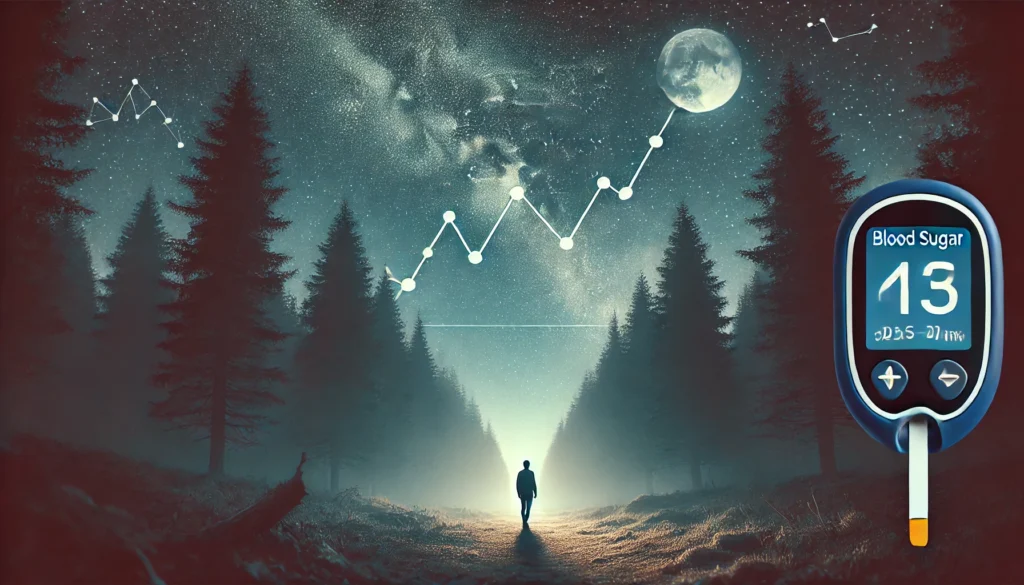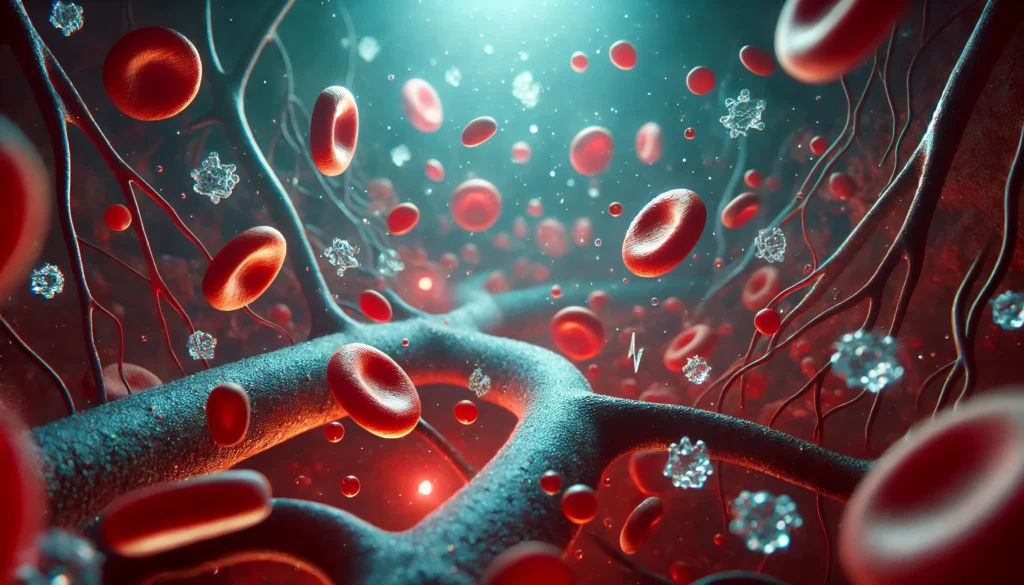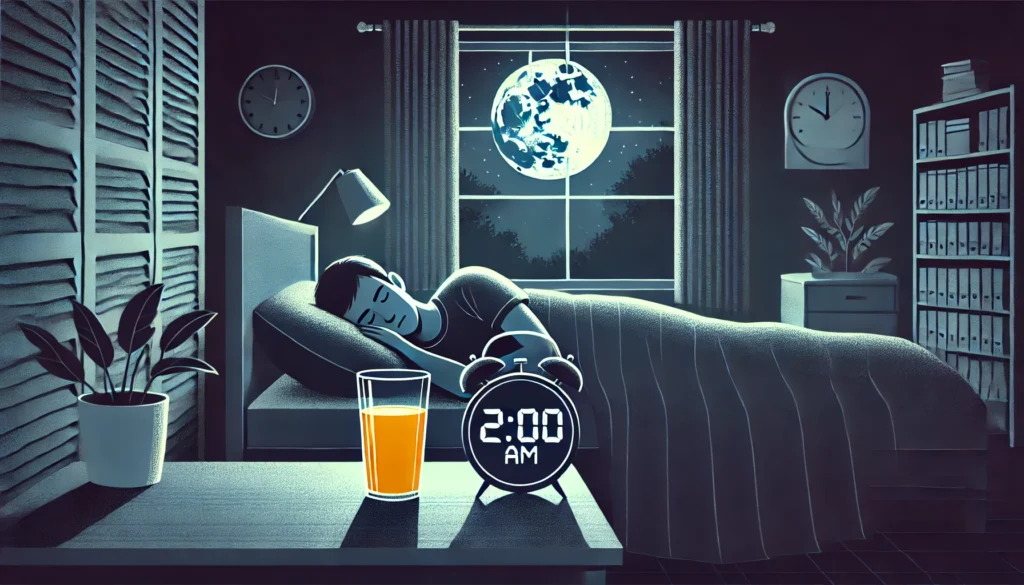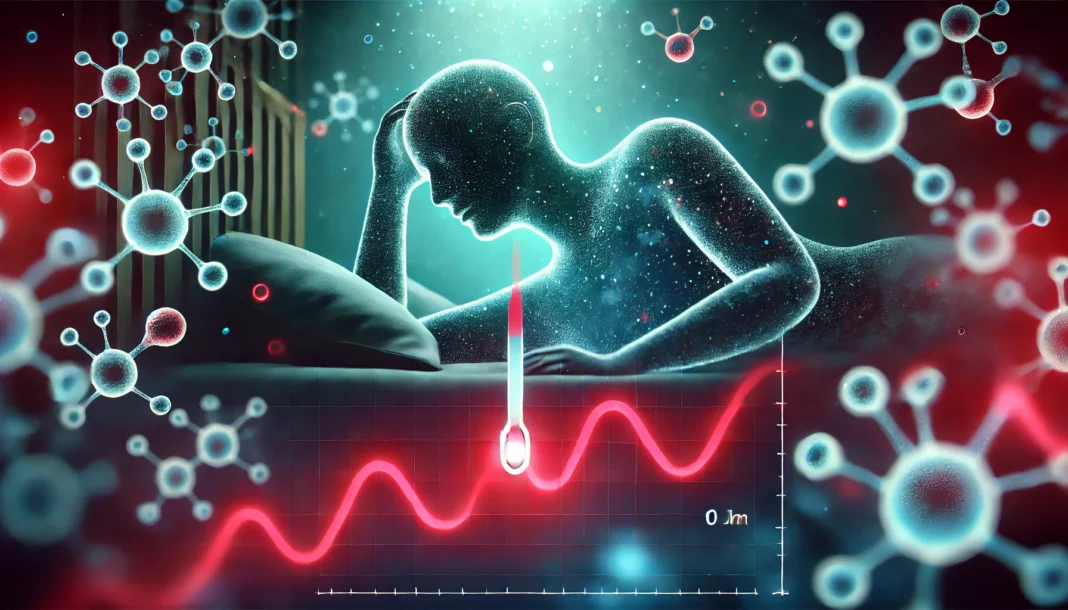Blood sugar regulation is a complex physiological process that affects nearly every system in the body. While fluctuations in glucose levels throughout the day are expected, sudden drops during sleep can be concerning and potentially dangerous. Many individuals experience nocturnal low blood sugar, also known as nighttime hypoglycemia, without fully understanding its causes or implications. This article explores the intricate mechanisms behind low blood sugar at night, examining the contributing factors, potential health risks, and practical strategies to maintain stable glucose levels during sleep. By delving into the science of blood sugar drops at night, we aim to provide a comprehensive resource for those affected by hypoglycemia during sleep.
You may also like: How Diabetes Affects the Brain: Understanding Brain Fog, Memory Loss, and Mental Confusion from High Blood Sugar
Understanding Blood Sugar Regulation During Sleep
The body relies on a delicate balance of hormones, enzymes, and metabolic processes to maintain stable blood sugar levels. Throughout the day, meals and physical activity influence glucose fluctuations. However, during sleep, the body continues to regulate glucose through a series of hormonal adjustments. The liver plays a pivotal role in this process by releasing glucose into the bloodstream as needed, ensuring that vital organs receive a steady energy supply.
One of the primary hormones involved in blood sugar regulation is insulin, which facilitates glucose uptake by cells. In contrast, counter-regulatory hormones such as glucagon, cortisol, and epinephrine work to prevent blood sugar from dropping too low. During sleep, insulin levels naturally decrease while glucagon and cortisol levels rise slightly to sustain glucose availability. However, disruptions in this balance can lead to nocturnal low blood sugar, particularly in individuals with diabetes or other metabolic disorders. Understanding how these hormones interact is essential for identifying and addressing the causes of hypoglycemia during sleep.

Common Causes of Blood Sugar Drops at Night
Several factors contribute to nocturnal low blood sugar, ranging from dietary habits to underlying health conditions. One of the most common causes is the use of insulin or other glucose-lowering medications, which can sometimes lead to an excessive drop in blood sugar levels. People with diabetes who take long-acting insulin or certain oral medications are particularly susceptible to experiencing hypoglycemia during sleep.
Another key factor is inadequate carbohydrate intake before bedtime. The body relies on stored glucose, known as glycogen, to maintain blood sugar levels overnight. If an individual does not consume enough carbohydrates in the evening, glycogen stores may become depleted, resulting in a blood sugar drop at night. Similarly, engaging in intense physical activity during the evening hours can deplete glycogen stores and increase the likelihood of hypoglycemia.
Hormonal fluctuations also play a role in nocturnal low blood sugar. For example, growth hormone, which peaks during sleep, can impact glucose metabolism by reducing insulin sensitivity. Additionally, individuals with adrenal insufficiency may struggle to produce adequate amounts of cortisol, a hormone that helps maintain stable blood sugar levels. These hormonal imbalances can disrupt normal glucose regulation and contribute to blood sugar drops at night.
Symptoms and Risks of Nocturnal Low Blood Sugar
Recognizing the symptoms of hypoglycemia during sleep is crucial for preventing complications. Common signs include night sweats, restlessness, heart palpitations, and frequent awakenings. In some cases, individuals may experience vivid nightmares or confusion upon waking, indicating that their blood sugar has dropped significantly. Severe nocturnal hypoglycemia can lead to more alarming symptoms, such as seizures or loss of consciousness, particularly in people with diabetes who rely on insulin therapy.
The risks associated with blood sugar drops at night extend beyond immediate symptoms. Recurrent nocturnal hypoglycemia can impair cognitive function, increase the risk of cardiovascular events, and contribute to overall metabolic instability. Prolonged episodes may also trigger the “Somogyi effect,” a phenomenon in which the body overcompensates for low blood sugar by releasing excess glucose, leading to morning hyperglycemia. Addressing the underlying causes of nocturnal low blood sugar is essential for mitigating these risks and promoting overall health.
Preventive Strategies for Managing Nighttime Hypoglycemia
To prevent blood sugar drops at night, individuals can adopt several practical strategies tailored to their unique needs. One of the most effective approaches is adjusting dietary habits. Consuming a balanced meal or snack before bedtime that includes complex carbohydrates, protein, and healthy fats can provide a sustained source of glucose throughout the night. For example, a combination of whole grains, nuts, and yogurt can help stabilize blood sugar levels and reduce the risk of nocturnal hypoglycemia.
Monitoring and adjusting medication regimens is another critical aspect of managing blood sugar during sleep. People with diabetes should work closely with their healthcare providers to optimize insulin dosing and medication timing. Continuous glucose monitoring (CGM) systems can also provide real-time insights into blood sugar fluctuations, alerting individuals to potential drops before they become severe. Implementing these technologies can enhance overall glucose control and improve sleep quality.
Lifestyle modifications, such as adjusting physical activity levels and stress management, can further support blood sugar stability. Engaging in strenuous exercise too close to bedtime may increase the risk of nocturnal hypoglycemia, so it is advisable to complete workouts earlier in the day. Additionally, managing stress through relaxation techniques, such as meditation or deep breathing, can help regulate cortisol levels and prevent blood sugar imbalances.
The Connection Between Sleep Quality and Blood Sugar Levels
Sleep quality and blood sugar regulation are closely intertwined. Poor sleep can disrupt hormonal balance, increase insulin resistance, and contribute to metabolic dysregulation. Research suggests that individuals with sleep disturbances, such as insomnia or sleep apnea, are at a higher risk of experiencing blood sugar drops at night. Addressing sleep disorders and improving sleep hygiene can have a significant impact on overall glucose control.
Creating a conducive sleep environment is essential for maintaining stable blood sugar levels. This includes establishing a consistent bedtime routine, minimizing exposure to blue light from screens before bed, and keeping the sleeping area cool and dark. Additionally, practicing relaxation techniques before bedtime can help reduce stress and promote restorative sleep, further supporting blood sugar regulation.
Long-Term Implications of Nocturnal Low Blood Sugar
Repeated episodes of nocturnal hypoglycemia can have long-term implications for metabolic health. Chronic exposure to low blood sugar levels may increase the risk of developing insulin resistance, leading to greater difficulty in maintaining glucose stability. Furthermore, the stress response triggered by hypoglycemia can contribute to systemic inflammation, which is linked to various health conditions, including cardiovascular disease and cognitive decline.
Individuals who frequently experience blood sugar drops at night should consider undergoing a comprehensive medical evaluation to identify any underlying metabolic or hormonal imbalances. Addressing these factors proactively can improve overall well-being and reduce the risk of complications associated with hypoglycemia during sleep. By adopting a holistic approach to blood sugar management, individuals can enhance their metabolic resilience and maintain optimal health over the long term.

Frequently Asked Questions About Nocturnal Hypoglycemia
1. How can stress and anxiety contribute to nocturnal low blood sugar?
While stress is often associated with elevated glucose levels due to cortisol, chronic anxiety can paradoxically increase your risk of nocturnal low blood sugar. This is because prolonged stress may lead to irregular eating patterns, adrenal fatigue, or overuse of stimulant medications, all of which can disrupt your body’s glucose regulation during sleep. Moreover, people with anxiety may unconsciously restrict carbohydrates out of fear of weight gain, making them more vulnerable to blood sugar drops at night. If you’re managing stress-related health issues, it’s important to evaluate how your emotional health could be triggering hypoglycemia during sleep. Tailoring a nighttime routine that reduces cortisol spikes—such as incorporating magnesium supplements or practicing deep-breathing exercises—can help minimize episodes of low blood sugar at night.
2. What role does exercise timing play in preventing hypoglycemia during sleep?
Late evening workouts can deplete glycogen stores and significantly increase your risk of experiencing hypoglycemia during sleep, especially if you don’t replenish with a balanced post-workout meal. When you exercise vigorously in the evening without adequate recovery nutrition, your body may continue to burn glucose overnight, leading to blood sugar drops at night. To avoid this, plan workouts earlier in the day and ensure your evening meal includes complex carbs, protein, and a small amount of healthy fat. This strategy helps maintain more stable glucose levels and reduces the likelihood of nocturnal low blood sugar. Athletes with type 1 diabetes should also consider using continuous glucose monitors (CGMs) to track nighttime glucose fluctuations after intense activity.
3. Why does my blood sugar drop at night even when I eat before bed?
Even if you consume a bedtime snack, blood sugar drops at night can still occur if the snack lacks balance or if insulin timing is mismatched. A common mistake is eating a simple carbohydrate (like fruit or crackers) without pairing it with fat or protein, which can lead to a rapid spike and subsequent crash in glucose. Additionally, certain long-acting insulins or medications can peak during the night, exacerbating the risk of nocturnal low blood sugar. If you’re wondering “why does my blood sugar drop at night despite my efforts,” it may be time to reassess your insulin regimen or work with a dietitian to customize your macronutrient ratios. Tracking your blood glucose trends over several nights can also uncover hidden patterns that contribute to hypoglycemia during sleep.
4. Can nighttime alcohol consumption lead to nocturnal low blood sugar?
Yes, alcohol disrupts glucose metabolism and may significantly increase the risk of nocturnal low blood sugar, especially when consumed without food. The liver prioritizes metabolizing alcohol over maintaining glucose levels, which can cause delayed hypoglycemia during sleep—sometimes six to ten hours after drinking. This is particularly concerning for individuals with diabetes who use insulin or sulfonylureas. To prevent blood sugar drops at night, always eat a balanced meal with alcohol, and avoid drinking close to bedtime. Understanding how alcohol interferes with glycogen release is essential when managing hypoglycemia during sleep, as the effects can be delayed and unpredictable.
5. How does poor sleep quality worsen the impact of low blood sugar at night?
Sleep fragmentation can impair the body’s ability to respond to glucose drops effectively. Normally, the body releases counterregulatory hormones like glucagon and epinephrine to correct nocturnal low blood sugar. However, when sleep is disrupted—whether by apnea, restless legs, or environmental noise—these hormonal responses may be blunted. Consequently, the risk of prolonged hypoglycemia during sleep increases, and you may wake up feeling disoriented or unusually fatigued. Investing in sleep hygiene, such as maintaining a dark, cool room and using white noise machines, can help the body better defend against blood sugar drops at night. This insight illustrates the intricate relationship between sleep architecture and glycemic control.
6. Are there emerging technologies to detect and prevent hypoglycemia during sleep?
Yes, several advancements in diabetes tech now offer more robust protection against nocturnal low blood sugar. Closed-loop insulin delivery systems (also known as artificial pancreas systems) can automatically adjust basal insulin in response to falling glucose levels, reducing the risk of hypoglycemia during sleep. Additionally, modern CGMs can send real-time alerts to smartphones or smartwatches when blood sugar drops at night, allowing for faster intervention. Some systems even include predictive algorithms that anticipate lows before they occur. For those frequently asking “why does my blood sugar drop at night even with good control?”, these tools offer a proactive solution that enhances both safety and peace of mind.
7. What are the long-term risks of repeated nocturnal low blood sugar episodes?
Chronic exposure to low blood sugar at night can desensitize your body’s natural warning signs, leading to hypoglycemia unawareness—a dangerous condition where you no longer feel symptoms like sweating or shaking. Over time, this increases the risk of severe episodes that could result in seizures or unconsciousness during sleep. Additionally, persistent hypoglycemia during sleep has been linked to mood disturbances, cognitive impairment, and cardiovascular stress. While immediate treatment is crucial, addressing the long-term impact of blood sugar drops at night requires a holistic approach that includes sleep management, medication review, and psychological support. It’s not just about treating the symptom—it’s about protecting long-term health.
8. How do hormones like cortisol and growth hormone affect blood sugar drops at night?
Cortisol and growth hormone both play critical roles in glucose regulation during sleep. Cortisol levels typically rise in the early morning hours, which can help stabilize blood sugar—but if this surge is delayed or blunted due to adrenal issues or medication, it may contribute to nocturnal low blood sugar. Similarly, growth hormone, which peaks during the first half of sleep, can temporarily block insulin’s action. However, irregular secretion patterns—common in shift workers or those with sleep disorders—can destabilize this balance, increasing the likelihood of hypoglycemia during sleep. For individuals wondering “why does my blood sugar drop at night despite healthy habits?”, disrupted hormonal rhythms could be the missing link.
9. Is there a link between gastrointestinal issues and low blood sugar at night?
Yes, gastrointestinal conditions like gastroparesis can cause delayed digestion and erratic glucose absorption, making blood sugar management more complex. In people with gastroparesis, food may remain in the stomach for hours before entering the bloodstream, leading to unexpected drops in glucose levels overnight. This can result in hypoglycemia during sleep even if pre-bed meals are properly planned. If blood sugar drops at night are unpredictable and coincide with symptoms like bloating, nausea, or early satiety, it’s worth discussing digestive health with your healthcare provider. Tailoring meal timing and composition—such as using liquid nutrition or easily digestible foods—can help reduce the risk of nocturnal low blood sugar in these cases.
10. What can caregivers do to support someone with frequent nocturnal hypoglycemia?
For caregivers, awareness and preparation are key. Keeping fast-acting glucose sources at the bedside, understanding how to use emergency treatments like glucagon, and knowing the signs of hypoglycemia during sleep—such as night sweats, vivid dreams, or abrupt waking—can make a critical difference. Many caregivers find it helpful to use shared CGM apps to monitor nighttime glucose trends remotely. If your loved one frequently asks, “why does my blood sugar drop at night?” it may be time to reevaluate their entire diabetes management plan with a specialist. Caregivers should also be educated on the emotional toll of recurring nocturnal low blood sugar, offering not just physical but emotional support to reduce fear and sleep-related anxiety.

Final Thoughts on Managing Nocturnal Low Blood Sugar
Understanding the science behind nocturnal low blood sugar is crucial for individuals who experience blood sugar drops at night. By recognizing the contributing factors, symptoms, and potential risks, individuals can take proactive steps to manage hypoglycemia during sleep. Implementing dietary adjustments, optimizing medication regimens, and improving sleep quality are all essential strategies for maintaining stable blood sugar levels overnight.
For those struggling with recurrent nocturnal hypoglycemia, consulting with a healthcare professional is highly recommended. Personalized medical guidance can help identify the underlying causes of blood sugar drops at night and provide tailored recommendations for effective management. Through informed decision-making and lifestyle modifications, individuals can achieve better glucose control and reduce the impact of hypoglycemia during sleep, ultimately improving overall health and well-being.
healthy glucose levels, nighttime hypoglycemia prevention, managing blood sugar overnight, sleep and blood sugar regulation, insulin sensitivity during sleep, avoiding low blood sugar at night, hormonal balance and glucose control, continuous glucose monitoring benefits, impact of exercise on blood sugar, dietary strategies for stable blood sugar, glucose metabolism during sleep, best bedtime snacks for blood sugar control, cortisol and blood sugar stability, managing diabetes and sleep, nighttime glucose fluctuations
Further Reading:
Nocturnal hypoglycemia: clinical manifestations and therapeutic strategies toward prevention
Tips to Avoid Nocturnal Hypoglycemia When You Have Type 1 Diabetes
Disclaimer: The content published on Better Nutrition News (https://betternutritionnews.com) is for informational and educational purposes only. It is not intended as a substitute for professional medical advice, diagnosis, or treatment. Always seek the guidance of a qualified healthcare professional before making any changes to your diet, nutrition, or wellness practices. The opinions expressed by authors and contributors are their own and do not necessarily reflect those of Better Nutrition News.
Better Nutrition News and its affiliates make no representations or warranties regarding the accuracy, completeness, or reliability of the information provided. We disclaim all liability for any loss, injury, or damage resulting from the use or reliance on the content published on this site. External links are provided for reference purposes only and do not imply endorsement.



